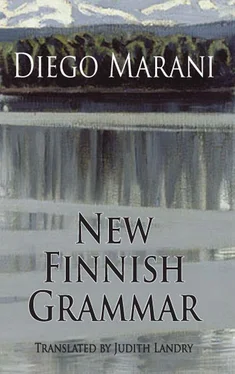These are the clearest pages in the document. Koskela had evidently lent a hand in the drafting of these memories, which were probably put down on paper a long time after the author’s arrival in Helsinki. Some sentences have corrections in a different hand, or are recopied correctly beneath the original. The frequent exercises in inflection and breaking down into syllables of the nouns subject to vowel-change, interspersed throughout the text, bear witness to the perseverance and tenacity with which the author studied the Finnish language, at least during the time the pastor was at his side.
A few days ago, Miss Koivisto suggested that we visit the air-raid shelter where the hospital staff would take refuge during the bombardments. I too was interested in seeing another of the places mentioned in the manuscript, in the vague hope of finding some trace of its author. We turned off the road and found ourselves in a dark space, littered with lumps of plaster and broken glass. Purely by chance, my torch picked out various names and bits of writing carved into the black tiles on the wall, and I suddenly felt deeply unsettled, my instinct telling me that I should instantly look away again. And yet, deep down, some deeply buried compulsion drove me to read each and every one of them, as though they might contain some secret. It was climbing the stairs, back into the white light of the road, that the memory flashed into my mind, that on the other pavement I suddenly recognized the barracks to which my father had been taken the evening they arrested him at the university. In my mind’s eye I saw again the ill-lit parlour, the guards standing around it, the wooden plank beds carved with threatening words, recently gouged resentfully out of the dressed wood like so many wounds, and my father looking at me wordlessly from the other side of the grille. It was meant to be a reassuring look, it was an attempt to inspire trust, but in fact that mask of bogus confidence would sometimes slip, leaving me alone, exposed to the full weight of his own fear. That was the last time I saw him; and, as though I knew as much, I remember how determined I was to slip my fingers through the mesh of the grille for one last clasp of his hand.
Dusk came early at that time of the year. The snow was not enough to light up the empty city, barred and bolted as it was, with all the windows dark. The main monuments, caged in by wooden beams, were reminiscent of the catafalques of some forgotten religion. The buildings in the city centre were empty, the ministries and government offices deserted, having been transferred to underground premises out of town. Although it was not yet at war, Helsinki was a city in a state of siege; the only people in its streets were hurried civilians and drunken soldiers. Fear oozed into the city from the frozen bay, lapping at the streets and squares. Death entered it with the trainloads of refugees, and spread throughout the smoke-filled lairs where the few remaining inhabitants had taken refuge. There was feverish talk of the latest news from the Russian front, of the siege of Leningrad, of the railway at Murmansk which no one had the courage to blow up. Some people cursed the war; the future seemed to be closing in on all sides, like the horizon around us. Each day seemed likely to be the last. This sense of doom was at its most tangible in the fug of the press-room in the Kämp, where I would take up my position in an armchair by the bar, among people I did not know. Together with the book of grammar Koskela had lent me, I would open up my notebook and start copying out words from the newspapers, while listening in on the conversations going on around me. Whenever some important army officer or civil servant entered the room, a small knot of journalists would suddenly form, shouting out questions and leafing through their notepads. I would slip in amongst them, listening to each question as though it were the one I myself would have liked to ask and staring firmly into the eyes of the person being questioned while he gave his reply. Although I had only the barest grasp of what was being said, I laughed along with the reporters, and shook my head to indicate that I shared their irritation when the replies were too evasive. They offered me cigarettes and glasses of brandy, which I accepted without a word of thanks, as though they were my due. When the hubbub died down and everyone went back to their seats, I too would settle down on a nearby sofa, open the Helsingin Sanomat and pretend to read.
It was in the Kämp that I finally became friendly with a German journalist, although perhaps he was rather an acquaintance than a friend. We would greet each other and sit together without speaking, as though we had no need of words to understand each other. He must have pieced together his own version of my story from the few words we had actually managed to exchange. I knew that he was a journalist, and that he was German: that was enough for me. Hearing him talk his language, on the telephone or with some diplomat, I was reminded of the weeks I had spent on board the Tübingen, of the merciless blue of that sea, so different from the desert of ice that lay before Helsinki, of the radiant vision of Trieste and the kindly attentions of Doctor Friari. Since any attempt at conversation required an extreme effort, we had tacitly decided to abandon any further deepening of our friendship. After all, in that doom-laden atmosphere nothing seemed to have a future and friendship, like love, served merely to pass the time. For me, not having to talk was always a relief; but his presence reassured me, gave me a sense of warmth. I would pretend that I had ended up sitting beside him by pure chance; with my notebook, pencil and newspaper, I liked to imagine that I too was a journalist, but I kept this piece of make-believe to myself. He would glance at me out of the corner of his eye, and seemed to have understood everything about me. One night the lobby of the Kämp was strangely deserted; he was sitting typing in a corner, next to the piano, I was in an armchair trying to put off the moment of returning to the hospital for as long as possible. I had drunk and smoked too much and was about to fall asleep, when I heard him whistling a tune which I must already have known. Without realizing it, I began to sing: ‘Davanti un fiasco di vin, quel fiol d’un can fa le feste, perche xe un can de Trieste, e ghe piasi el vin!’ He turned round, intrigued, breathing the smoke from his recently discarded cigarette out through his nostrils. I raised the empty glass I was still holding and repeated that one verse of a popular drinking-song I’d heard so often in the beer-houses in Trieste. Smiling though disconcerted, the journalist offered me a cigarette and made some surprised comment in German. I shrugged, pointing to a print of a ship which was hanging on the wall. From then onwards he took to calling me ‘Trieste’, and that was how he introduced me to his colleagues. He had realized that I was not in fact a journalist, but apart from some vague questions about Trieste, he had never asked me anything. He observed and respected the mysterious notebook in which he saw me scrupulously taking down the words I would underline in the Helsingin Sanomat ; without guessing the secret thread that ran between them, he had nonetheless sensed that they were not taken entirely at random. Seeing that I spent most of my time wandering around without anything to do, at first sporadically but then increasingly often he began to use me as an errand boy, sending me to the post with telegrams, to the Hotel Torni to pick up messages or buy him a newspaper, rewarding me with the odd mark and the occasional cigarette. He made his requests known to me by means of an extremely effective range of gestures, backed up by his personal brand of international German: ‘Trieste, bitte, telegramm presto zum Post!’ he would say, without taking the cigarette from his mouth. When he left for the front at the beginning of June, other journalists employed my services. So, as time passed, everyone at the Kämp knew me, even though they knew nothing about me. The Kämp had become my home from home; I felt less anxious there, and my jacket was just one blue sailor’s jacket hanging among others.
Читать дальше












